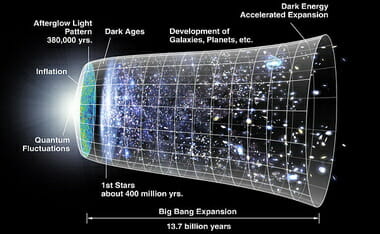First, let Alexander Vilenkin define “nothing”
Borde-Guth-Vilenkin Theorem Discussed:
Technical Presentation by Vilenkin Himself:
More on the BGV Theorum:
How atheists misuse the BGV theorem:

First, let Alexander Vilenkin define “nothing”
Borde-Guth-Vilenkin Theorem Discussed:
Technical Presentation by Vilenkin Himself:
More on the BGV Theorum:
How atheists misuse the BGV theorem:

Here is a detailing of the above in a book I recently read:
“There is no need for God,” Atkins declared. “Everything in the world can be understood without needing to evoke a God. You have to accept that’s one possible view to take about the world.”
“Sure, that’s possible,” Craig admitted. “But—”
[Interrupting] “Do you deny that science can account for everything?” challenged Atkins.
“Yes, I do deny that science can account for everything,” said Craig.
“So what can’t it account for?” demanded Atkins.
“I think that there are a good number of things that cannot be scientifically proven, but that we’re all rational to accept,” Craig began.
[Interrupting] “Such as?”
“Let me list five,” Craig continued. “[First,] logical and mathematical truths cannot be proven by science. Science presupposes logic and math so that to try to prove them by science would be arguing in a circle. [Second,] metaphysical truths like there are other minds other than my own, or that the external world is real, or that the past was not created five minutes ago with the appearance of age are rational beliefs that cannot be scientifically proven. [Third,] ethical beliefs about statements of value are not accessible by the scientific method. You can’t show by science that the Nazi scientists in the camps did anything evil as opposed to the scientists in Western democracies. [Fourth,] aesthetic judgments cannot be accessed by the scientific method because the beautiful, like the good, cannot be scientifically proven. And finally, most remarkably, would be science itself. Science cannot be justified by the scientific method, since it is permeated with unprovable assumptions. For example, the special theory of relativity—the whole theory hinges on the assumption that the speed of light is constant in a one-way direction between any two points, A and B, but that strictly cannot be proven. We simply have to assume that in order to hold to the theory!”
Feeling vindicated, Buckley peered over at Atkins and cracked, “So put that in your pipe and smoke it.”
Frank Turek, Stealing from God (Colorado Springs, CO: NavPress, 2014), 162-163.

Ever hear an atheist say he’s a freethinker? Well, if atheism is true, an atheist, cannot be free nor would his thinking make any real sense. Frank Turek explains.

William Lane Craig on the question if a Christian can be gay? Also, read Craig’s article: Christian Homosexuals? Also, see my post on this matter: Gay Christians?

Cornerstone Christian Fellowship (2013) – Religious IQ – Week 6. Catholicism. Lecture by Linn WInters.

I have been politely challenged by a person on one of my YouTube uploads. I responded to one challenge already. After responding to it I was challenged with another supposed contradiction in the Bible. I doubt highly the questioner is truly in search for truth in these matters as much as they are more concerned in a masochistic drive to circle the wagons around their unbelief. So I suggested two books for him to get to answer his own questions rather than ask me.
However, after the following challenge I said he should read one book:
But… he pushed another “contradiction.” So I am responding to it. But I am not at this person’s beckon-call.
Here is the challenge:
The different gospels clearly contradict each other on Jesus’ last words on the cross.
Matthew 27:46: Eli, Eli, lama sabachtani? that is to say, My God, My God, why hast thou forsaken me?
(Verse 50 says he cried out again before dying, but no mention is made of spoken words.)
Luke 23:46: Father, into thy hands I commend my spirit.
John 19:30: It is finished
I then asked if he had seen Monty Python’s “Life of Brian.” He said “No.” I linked to the below video to make a point:
[I love the parts where they do not hear what Jesus is saying, and so substitute what they think He said: “Blessed are the Greeks,” for example.]
I respond:
Similarly, you seem to have an unrealistic view of the historical scene we know happened at Calvary. There were Roman soldiers keeping people back, gambling, talking, etc. Ambiant noises as well, horses, carts on a nearby road/trail, or the “clanging” of a blacksmith or shaking out of rugs, and the like. Likewise, people around the scene were crying, talking, some closer, others further away from the crosses.
In fact, John mentions he was close to the Cross, probably hearing things the others didn’t:
John 19:25-27 “Standing by the cross of Jesus were His mother, His mother’s sister, Mary the wife of Clopas, and Mary Magdalene. When Jesus saw His mother and the disciple He loved standing there, He said to His mother, ‘Woman, here is your son.’ Then He said to the disciple, ‘Here is your mother.’ And from that hour the disciple took her into his home.”
Combining the three accounts, we read:
“And about the ninth hour Jesus cried with a loud voice, saying, ‘Eli, eli, lama sabachthani?’ that is to say, ‘My God, my God, why hast thou forsaken me?’….Jesus, when he had cried again with a loud voice said , ‘Father, unto thy hands I commend my spirit:’ (notice the cry with a loud voice is separated from Jesus commending His spirit, probably quieter), then he said softly, ‘It is finished:’ and he bowed his head, and gave up the ghost.”
JUST like a police officer or insurance adjuster will do from multiple eyewitnesses to a vehicle accident. People who see the same incident — maybe from a similar viewing position or from different places [say on different corners] — have different/varying descriptions… of the same incident.
In-other-words, there is no contradiction.
IN FACT, if these descriptions were identical, I would question if they were written by different people. I would charge collusion, like two criminals getting their story straight before talking to a police officer.
He responds:
Yes, but some Christians including yourself claim that the Bible is perfect and has zero contradictions. Three people claim Jesus said three different things right before he died.
I respond:
It doesn’t have any real contradictions. I have written about inerrancy here. For instance, you have not shown a contradiction., Jesus said all those things before he dies, people just heard them and others did not. It is not a contradiction.
John heard His [Jesus’] last ~ QUIET ~ words (remember, he was closer);
…AND…
Matthew heard His [Jesus’] last ~ LOUD ~ words.
Again, you have not shown a contradiction that isn’t easily explained by the historical setting. Unless you reject my verse documenting John’s closeness to the Cross and accept the verses you are using as valid? A double standard?
You seems to not be distinguishing between what a contradiction is verses a difference:
First, it’s important to distinguish between contradiction and difference. Just because two passages are different, doesn’t mean they contradict each other. For example, Matthew 27:5 says that Judas hung himself, while Acts 1:18 says that he fell to the ground and burst wide open. These are two different accounts of Judas’ death, but they are not formal contradictions. A contradiction would be one passages saying, “Judas hung himself and died” and another passage saying, “Judas didn’t hang himself; rather, he threw himself from cliff and splattered on the ground.”
In the Bible, it could be that he hung himself in a high tree, and then the rope snapped and he fell headlong and burst all over the ground. Or maybe his attempt at hanging himself didn’t work (Matthew 27 doesn’t actually say he died from hanging himself), and so he went and threw himself from a cliff, as recorded in Acts.
Or maybe there are other options. The point is, many apparent contradictions aren’t really formal contradictions at all. They’re simply different accounts, different perspectives, or different versions of the story…
Some other thoughts on this are as follows. One I particularly like Youth Apologetics Training:
I would define someone’s last words as what they spoke during the last movements of their lives. The patriarch Jacob spoke many last words over his sons before he died (Gen 49). His long prophecy over his boys could all be considered his last words.
Even the idea of “last words” is being defined in a literal, wooden sense when more of an “idea” of last words is being presented. (Something, ironically, we are accused of, that is: being literal or taking the Bible as literal. Here we see the skeptic doing so, incorrectly I night add.) Or at least is an option that takes away a supposed contradiction. WIKI notes the definition:
Apologetic Press discusses these verses a bit:
On a regular basis, atheists, agnostics, skeptics, and Bible critics write our offices at Apologetics Press. Some of the feedback we receive is simply to inform us how naïve Christians are for believing in God, Jesus, and the Bible, or how ignorant creationists are for disbelieving in macro-evolution. We also receive numerous questions from these non-believers. (Unfortunately, due to the volume of inquiries we receive, we are unable to answer all of them.) Recently, one Bible critic sent the following note:
You say the Bible does not contradict itself but I have found several contradictions in the Bible. For example, in John 10:30 Jesus says that he and his father are one then in John 14:28 he says his father is greater than he. Did he change his mind?
So what were Jesus’ last words? Well Matthew, Luke and John seem to have all heard something different. In Matthew 27:46,50 Jesus said my god my god why has thou forsaken me then died but in Luke 23:46 he claims Jesus said father unto thy hands I commit thy spirit then died and finally in John 19:30 he claims that Jesus said it is finished then died. Well which one is it? These are just a few of many. Why would someone say the Bible doesn’t contradict itself when if you have read the words in its pages it does not take a genius to see all the falsities within.
Consider how easily these questions can be answered simply by remembering two basic rules of interpretation.
First, supplementation is not equivalent to a contradiction. For example, suppose you tell a friend about your trip to Disney World. You mention that you went to Magic Kingdom on Monday. Later, you state that you went to Hollywood Studios on Monday. Have you lied? Are these two contradictory statements? Not necessarily. It could be that you visited both Magic Kingdom and Hollywood Studios on the same day. Similarly, the seven statements the gospel writers recorded that Jesus made from the cross (including the three aforementioned statements—Matthew 27:46; Luke 23:46; John 19:30) all supplement one another. Nothing is said about Jesus making only one of these statements. What’s more, silence does not negate supplementation. Simply because John wrote that our suffering Savior said, “‘It is finished!’ And bowing His head, He gave up His spirit” (John 19:30), does not mean that Jesus could not also have said, “Father, into Your hands I commit My spirit” after He had cried out, “It is finished,” and before His death (Luke 23:46). Nothing in John 19:30, Luke 23:46, or Matthew 27:46,50 is contradictory. We simply have three different statements that Jesus made at three different moments during His crucifixion….

A video letter to Reasonable Faith Ministries that is important:
Imagine being the youth pastor at your church, leading a Bible study for two years, only to have an elder’s son tell you that he’s decided to become an atheist. Tim Stratton was shocked. “Why would you believe that?” he exclaimed. The student responded, “I’ll tell you what. If you can answer just one of these questions, just one of these objections, I’ll stick around.” However, Tim was not equipped to answer any of the objections the young man had found reading the New Atheists.
Tim was shaken, but he realized that as a shepherd of God’s people, he needed to learn how to defend the sheep. That’s when he discovered the resources of Reasonable Faith. Tim says, “Wow! My life was transformed by the renewing of my mind. Now, I had reasons to believe!”

This is an important discussion because Dr. Craig points out the proclivity for principles of special rights that counter equal rights. This podcast from Reasonable Faith (http://www.reasonablefaith.org/) is a great addition to the conversation we ALL should be having.
AGAIN, William Lane Craig does an excellent duty in treading the conservative Evangelical ~ Constitutional viewpoint in discussing Same Sex Marriage.
One should see my post on Christians who are living a chaste life or a changed life because of Christ!
Before beginning this import from my old blog, let me say, the video I am updating this with is EXCELLENT! Not only can some creatures not known by modern man existed in the past (as my post shows), but the most plausible explanation is a change in definitions over the past couple hundred years. Good stuff Maynard.
This is a favorite of atheists, that is, to say that believing in God is just like believing in unicorns. The story use to be: believing in God is like believing in Santa Clause. But this analogy didn’t work to the atheists advantage… so they changed the story line.
However, this is not what the Christian is stating, and the analogy about Santa Clause will illustrate (which is why they changed the story line). First though, let me read from 1 Corinthians 15:14-17:
(14) And if Christ has not been raised, our preaching is useless and so is your faith. (15) More than that, we are then found to be false witnesses about God, for we have testified about God that he raised Christ from the dead. But he did not raise him if in fact the dead are not raised. (16) For if the dead are not raised, then Christ has not been raised either. (17) And if Christ has not been raised, your faith is futile; you are still in your sins.
Paul here is saying that this person Jesus is a historical being, and that his resurrection happened in history. Even the most ardent skeptic knows that Jesus existed in actual history, whereas we can say most probably — I will discuss this at the end — that unicorns do not exist. So the unicorn analogy is already falling apart. Which brings me to Jolly Old St. Nick.
Let us start with my favorite St. Nicholas who is said to have been from Asia Minor in what is now Turkey. He was a monk who rose to become the Bishop of Myra in the 4th century. Known for his generosity and compassion he worked to improve the lot of his fellow man. Stories and legends abound on the various things he is said to have done in helping the poor ranging from secret donations placed in shoes or stockings of the needy to protecting sailors at sea. He was imprisoned for ten years by the Romans as this was still a time of Christian persecution and was only released by the Emperor Constantine who was to later become Christian. He died Dec. 6th and that day is celebrated as St. Nicholas’s Day in much of Europe. His popularity only continued to grow following his death so that by the Middle Ages there were several thousand churches bearing his name.
This is closer to the analogy that we are looking for. Jesus REALLY existed; a monk named Nicholas REALLY existed. Horses REALLY exist.
There may be other discussions more valid here regarding whom Jesus of Nazareth was, but at least we need to realize that the unicorn analogy just doesn’t work. This puts mankind’s historic search for answers in a light not becoming of a persons intellect.
We are not applying Big-Bang cosmology and the beginning of the universe, the laws of causality, thermodynamics, the weak and strong nuclear forces (etc.) to a unicorn – which, if a historical mammal, would be within the space/time continuum… and thus subject to the laws of nature – but rather, we need a being that is the source or explanation for these historical events. We are looking to larger explanations as well as God’s actual dealing with events of history.
So the unicorn analogy would look more like this in the theistic sense of the explanation.
A friend said he met someone who said they saw a unicorn… in fact, he saw a family of them. They left the scene but there were many other people who saw it as well. In fact they wrote about it. Also discovered were hoof prints and a few shed horns. In fact, the government has tried to cover up this fact and started killing the eyewitnesses. They kill them because even under the most extreme torture conditions they are not recanting their stories. And we all know that if there were a group of people (say, 511 people) that would make up such a story that under torture conditions one of them would admit to lying. Because it is logical to think that people would die for a lie thinking it was true, but they wouldn’t die for a lie knowing it was a lie they fabricated. One bloke was tortured and then crucified on an upside down – broken – cross (Peter). Surely he would have recanted and settled this whole thing for the Roman Empire if he were knowingly lying.
This analogy is a bit closer to what is claimed in Scripture. Mind you the analogy is still a bit flawed, but at least the story line is closer to the truth of the HISTORICAL line of thinking. I will post this and a few other “pros” on my site for those who wish to actually study the issue instead of merely being critical of it. I am confident the evidence leads to God in general, and to Jesus specifically.
Below is just an historical example of this debate from the Grecian days. It is still relevant to this day, and a mammal that is subject to nature itself (like a unicorn) just doesn’t cut it in regards to explanatory power.
Plato wrote, “Some people, I believe, account for all things which have come to exist, all things which are coming into existence now, and all things which will do so in the future, by attributing them either to nature, … or chance.” Epicurean materialism was taught in the Stoic school founded by Zeno in 308 B.C.. And if there is a positive writing, there must be a negative one it is commenting on, for instance:
“When you see a sundial or a water-clock, you see that it tells time by design and not by chance. How then can you imagine that the universe as a whole is devoid of purpose and intelligence when it embraces everything, including these artifacts themselves and their artificers? Our friend Posidonius as you know has recently made a globe which in its revolution shows the movements of the sun and stars and planets, by day and night, just as they appear in the sky. Now if someone were to take this globe and show it to the people of Britain or Scythia [barbarians at this time] would a single one of those barbarians fail to see that it was the product of a conscious intelligence.” (Cicero, 106 B.C.–43 B.C.)
I hope one can see that the question of how we got here and us asking “what our purpose is in this existence we call life” is beyond a simple unicorn analogy. Not only that, but whomever makes the unicorn analogy should realize how un-educated this challenge really is.
Now to change the story a bit… I said that at this time we can say that unicorns do not exist, but history does hint at such a creature, since written records have been kept in fact. So it would be interesting to see if we can add a fossil find to the drawings and descriptions found through the historical record for creatures that are similar to the horse/ass that have a horn. Let’s just say the jury is still out.

King James VI of Scotland succeeded Elizabeth I when she died childless in 1603, effectively uniting Scotland and England beneath one rule. The Scottish Royal Arms had, up to that point, used two unicorns as shield supporters. The English Arms had used a variety of supporters, but most frequently had included a lion. In a tactful gesture then, he placed a lion upon the left of the new Arms, and a unicorn upon the right. This was a potent bit of symbolism, for both the lion and the unicorn had long been thought to be deadly enemies: both regarded as king of the beasts, the unicorn rules through harmony while the lion rules through might, It came to symbolise a reconciliation between the Scottish unicorn and the English lion that the two should share the rule.
In 416BC, the physician Ctesias set out from his native town of Cnidus to attend the Persian King Darius II. There he stayed for eighteen years, and learned of many wonderful things during his time at court. Upon returning to Cnidus, he wote a book of his experiences which he called the Indica. In it is the earliest surviving written account of a Unicorn:
“There are in India certain wild asses which are as large as horses, and larger. Their bodies are white, their heads are dark red, and their eyes dark blue. They have a horn on the forehead which is about eighteen inches in length. The dust filed from this horn is administered in a potion as a protection against deadly drugs.”
The great philospher Aristotle, whose words were taken so seriously that they were widely held as gospel truth a thousand years later, could have destroyed the infant legend with a sentence, whatever the truth of the matter. However, he confirms its existence by a passing comment, which, though flawed in content, proved that this great man of learning clearly believed there was such a creature.
“We have never seen an animal with a solid hoof and two horns, and there are only a few that have a solid hoof and one horn, as the Indian Ass and the Oryx.”
The “Indian Ass” is none other than Ctesias’ Unicorn. Pliny the Elder, in the first century AD, mentions Unicorns, saying of them that there is:
“…An exceedingly wild beast called the Monoceros, which has a stag’s head, elephant’s feet, and a boar’s tail, the rest of its body being like that of a horse. It makes a deep lowing noise, and one black horn two cubits long projects from the middle of its forehead. This animal, they say, cannot be taken alive.”
There are some indications here that he was confusing the creature with a rhinoceros, a creature known to his race but often confused because the rhino was a known animal and the Unicorn was not! It never crossed the minds of many scholars that they might be talking of one and the same creature!
The same mistake has been attributed to the Roman scholar Aelian, who lived some five hundred years after Aristotle. He wrote a book about animals that mentioned the Unicorn quite frequently. In one passage he states:
“I have found that wild asses as large as horses are to be found in India. The body of this animal is white, except on the head, which is red, while the eyes are azure. It has a horn on the brow, about one cubit and a half in length, which is white at the base, crimson at the top, and black between. These variegated horns are used as drinking cups by the Indians. …It is said that whosoever drinks from this kind of horn is safe from all incurable diseases such as convulsions and the so-called holy disease, and that he cannot be killed by poison.”
Elsewhere he says,
“They say that there are mountains in the interior regions of India which are inaccessible to men and therefore full of wild beasts. Among these is the Unicorn, which they call the kartajan [Sanscrit: Lord of the desert]. This animal is as large as a full-grown horse, and it has a mane, tawny hair, feet like those of an elephant, and the tail of a goat. It is exceedingly swift of foot. Between its brows there stands a single black horn tapering to a very sharp point. Where other animals approach it it is gentle, but it fights with those of its own kind. It seeks out the most deserted places and wanders there alone.”
Other notable Greeks and Romans have noted the unicorn: Julius Caesar for example, who said they could be found in the Hercynian Forest. However, for all the weight these mighty scholars and writers wielded in the literary world, the Unicorn was not well known among the ordinary people. It was yet a beast of books and libraries, and there it might have dwindled into obscurity and never been known to us….
….The unicorn had actually long been a Royal Beast associated with kings and rulers.
Aelian had said that only great men could own the cups made from his horn, and Philostatus had stated that only the kings of India might hunt them. The Physiologus mentions that the captive unicorn is taken before the King, and the Chinese Ki-lin has always been associated with Emperors. The Bible (Daniel chapter 8) relates the following vision:
“And behold, a he-goat came from the West on the face of the whole earth, and touched not the ground; and the goat had a notable horn between his eyes.”
The goat in question is later interpreted as “the king of Grecia”, Alexander the Great, and it is also interesting to note that Alexander was once gifted with a unicorn by Queen Candace as tribute. We know that Caesar also wrote of unicorns.  Ghengis Khan, about to invade India, saw a unicorn and took it as an omen that India was not to be his. He turned back immediately….
Ghengis Khan, about to invade India, saw a unicorn and took it as an omen that India was not to be his. He turned back immediately….
No invisible pink unicorns here!
CHRISTIANITY AND OUR TIMES
When we are asked why it is that there are so many persons who are indifferent to the claims of the Church, no doubt the safest answer to give is that it is for reasons best known to themselves. It seems, however, only a voluntary humility to profess to be ignorant of the fundamental basis of this indifference; an indifference, let it be well borne in mind, which is in no sense “modern,” but has characterized ever greater numbers as we go back in the history of the Church to the very beginning. It lies in a weak sense of sin and the natural unconcern of men who do not feel themselves sinners with respect to salvation from sin. For Christianity addresses itself only to sinners. Its Founder himself declared that he did not come to call the righteous but sinners; and its chief expounder declared with energetic emphasis that Christ Jesus came into the world to save sinners. When Sir Oliver Lodge announces, in words the truth of which is sufficiently avouched by the chorus of approval with which they have been greeted by those presumedly spoken of, that “as a matter of fact the higher man of today is not worrying about his sins at all, still less about their punishment,” he has uncovered the whole explanation of the current indifference to Christianity. He might have extended his remark, indeed, to cover the lower as well as the higher man, of other days as well as this: there have always been men in sufficient abundance, both higher and lower, who have not bothered themselves about their sins. The open secret of the indifference of men of all classes in all ages to Christianity, so far as that indifference has existed, lies in the indifference of men to sin, and their consequent indifference to salvation from sin. Christianity makes no appeal to men who do not feel the burden of sin.
And here we have already exposed the reason why no Christian Church can take up the position recommended to it on the strength of a declaration attributed to Abraham Lincoln. This declaration is to the effect that a simple requirement of love to God and our neighbor constitutes a sufficient foundation for a church, and the churches would profit by making the profession of such love, or of the wish or purpose to cherish such love, their sole qualification for membership. The moment a church took up such a position, however, it would cease to be a Christian Church: the core of Christianity is its provision for salvation from sin. No doubt by the adoption of such a platform many would be recovered to the Church who now stand aloof from it. But this would be not because the world had been brought into the Church, but because the Church had been merged into the world. The offense of Christianity has always been the cross; as of old, so still today, Christ crucified is to Jews a stumbling-block and to Greeks foolishness. It would be easy to remove the offense by abolishing the cross. But that would be to abolish Christianity. Christianity is the cross; and he who makes the cross of Christ of none effect eviscerates Christianity. What Christianity brings to the world is not the bare command to love God and our neighbor. The world needs no such command; nature itself teaches the duty. What the world needs is the power to perform this duty, with respect to which it is impotent. And this power Christianity brings it in the redemption of the Son of God and the renewal of the Holy Ghost. Christianity is not merely a program of conduct: it is the power of a new life.
It is a matter of complete indifference how much debated the constitutive doctrines of Christianity are, or how “controversial” they may be. Everything important is debated, and everything that is precious will certainly be dragged into controversy. If we are to hold to nothing that is questioned, we shall hold to nothing at all: we shall be as the beasts which are beyond good and evil. The very “brief statement” which is proposed – as a sufficient creed bristles with questions which are sharply debated and are in the highest degree controversial. If any one thinks it does not, let him ask Friedrich Nietzsche, or if that seems going too far afield, even J. M. E. McTaggart; or let him ask merely the man in the street whom he may haply find in some doubt whether it is better to do righteousness or to “do” his neighbor. What is important with respect to the doctrines which we lay at the basis of our church life and make the animating principles of our church organizations, is not that they shall be incapable of being debated and cannot raise “controversial” questions, but that they are sound, “wholesome,” for the soul’s health, the indispensable foundations for a life of service here to the God whose very name is holy and of communion with him and of rejoicing in him forever. Of course, they must be true. But that does not mean that they must be nothing but rational axioms which are intrinsically incapable of being denied, or ethical commonplaces to which all moral beings must assent, however far they may be from obeying them. They may — or, rather, they must — embody the great historical occurrences in which the God of grace has intervened in the life of sinful men for the purpose of redeeming men from their sins and restoring in their dead hearts the love of God and of their neighbor.
Since these great historical verities are constitutive of Christianity, wherever they are rejected or neglected Christianity has ceased to exist. This used to be well understood and candidly acknowledged. When a David Friedrich Strauss, for example, had drifted away from these great historical verities and sought the support of his religious life elsewhere, he asked himself straightforwardly, “Are we still Christians,” and frankly answered, “No.” Nowadays this seems to be all changed. Men cheerfully abandon the whole substance of Christianity, but will hardly be persuaded to surrender the name. Thus, Rudolf Eucken asks, “Can we still be Christians?” and answers with emphasis, Of course we can; providing only that by Christianity we do not mean — Christianity. Thus also Ernst Troeltsch declares himself still a Christian (a “free Christian”) , though his “Christianity” has been so “refashioned” that it has become nothing more than an “immanent theism,” the quintessential extract of the religious development of mankind, still holding to the name of Jesus only because it needs a rallying point for its worship and a name to conjure with. It is no doubt a tribute to the significance of Christianity in the world that men who are quite out of harmony with it should manifest such reluctance to surrender the name. But it certainly is very misleading to insist on calling by this name, which should have a definite content, the various congeries of notions each several man has picked up from the surface of the stream of modern thought as it flows by him and wishes to substitute for the thing itself to which the name really belongs as the substance of his religion.
If the term “Christianity” is to be as fluid as this, it has become in the strictest sense of the words an empty name. It no longer has any content of its own. It has become a purely formal designation for whatever may chance, in any age or company, to be thought the sum of the conclusions commended by the science, philosophy, or scholarship of the day. This is what it really comes to when it is demanded, as it so frequently is, that theology shall be kept in harmony with what are for the moment called “the assured results” of science, philosophy, and scholarship. The thing is, of course, impossible. Science, philosophy, scholarship, represent not stable but constantly changing entities. And nothing is more certain than that the theology which is in close harmony with the science, philosophy, and scholarship of today will be much out of harmony with the science, philosophy, and scholarship of tomorrow. A theology which is to be kept in harmony with a growing science and philosophy and scholarship, breaking their way onward by a process of trial and correction, must be a veritable nose of wax which can be twisted in any direction as it may serve our temporary purpose. If it be asked, therefore, in what way “the fundamental theology of the Church” “is to be related to the literary, scientific, and philosophical certainties of our time,” the answer certainly cannot be that it is to be subordinated to them and made their slave, tremblingly following their every variation as they zigzag their devious way onward toward the certainties, not “of our time,” but of all time. Theology is itself a science, with its own proper object, method and content: it has its own certainties to contribute to the sum of ascertained truth; and it dare not do other than place these certainties, established by their own appropriate evidence, by the side of any other certainties which may exist, as equally entitled with the best attested of them all to the acceptance of men. And if seeming inconsistencies appear, then there is nothing for it but patiently to await the coming of the better day when trial and correction have done their perfect work and the unity of all truth shall be vindicated by its realized harmony.
By “the fundamental theology of the Church” is meant especially the Church’s confession of that series of the redemptive acts of God, by which he has supernaturally intervened in human history for the salvation of sinful man, as interpreted and given their full meaning in the revelation which he has made to his people in time past at sundry times and in divers manners through his servants the prophets, and in these last times in his Son speaking through the apostles whom he appointed as his representatives in founding his Church. This is not a mass of cunningly devised fables, but the substance of saving truth. And no message can be effective for the salvation of a lost world which does not stand for and teach in the face of all hesitation and unbelief, denial and opposition, those things which constitute the sum-total of this saving truth, as it has been set down for us in Holy Scripture. The message of Christianity concerns, not “the values of human life,” but the grace of the saving God in Christ Jesus. And in proportion as the grace of the saving God in Christ Jesus is obscured or passes into the background, in that proportion does Christianity slip from our grasp. Christianity is summed up in the phrase: “God was in Christ, reconciling the world with himself.” Where this great confession is contradicted or neglected, there is no Christianity.